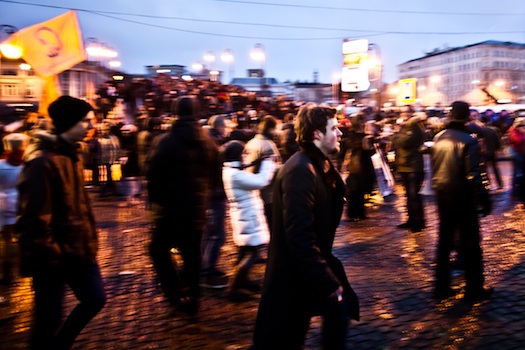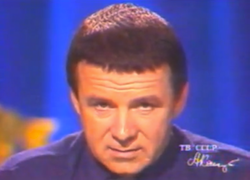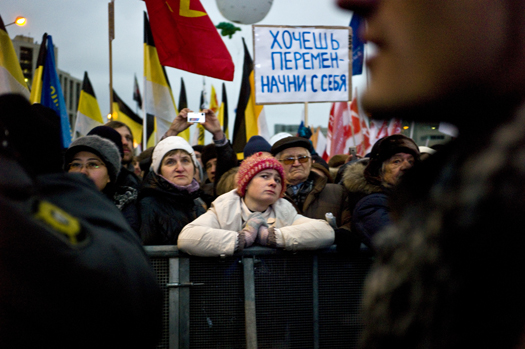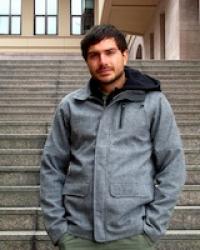
Protesters roam the streets of Moscow at the end of the December 10 gathering in Bolotnaya Square. (Max Avdeev)
At the end of 1989, when the Soviet Bloc was in its death throes, a miraculous healer appeared on TV. His name was Anatoly Kashpirovsky, a Ukrainian-born psychotherapist and self-appointed guru. His “tele-séances” were broadcast on the main channels in the Soviet Union and throughout Eastern Europe, entrancing 300 million people hungry for deliverance. Pirated videotapes of his appearances circulated among friends and neighbors. In Bulgaria, I remember my parents watching him in the evenings in our tiny apartment, highly skeptical of his methods, but nevertheless curious to see the famed man who claimed to cure, through hypnosis, every disease imaginable, including diabetes, tuberculosis, baldness, impotence, as well as cancer and AIDS. Dressed in black, with short-cropped hair and a mesmerizing glare, his voice a smooth baritone, he was the Rasputin of the television age, the last priest of the Soviet Empire.

A screen capture of one of Kaspirovsky’s tele-séances in the late 1980s.
“Some kind of power is keeping you glued to your seats and no one can leave, even the skeptics,” he would slowly say, staring directly into the camera, his forehead furrowed. A maudlin soundtrack would play in the background, as if Kashpirovsky was delivering a dramatic movie speech. “Don’t worry if you don’t feel anything… One, two, three, four… For many of you pain has already disappeared. And for many of you, when you encounter pain tomorrow, you won’t feel it anymore… Twelve, thirteen, fourteen, fifteen… I’m just counting, so you don’t think about the meaning of what’s being said.” By this point most people in the audience would have closed their eyes, swaying lightly in their seats.
It was a strange thing, the teachings of a mystic healer officially televised in the land of atheism and scientific progress. Could it be that, with the Soviet system morally and financially ruined, with the myths of Communist ideology dispelled, the leaders of the country were eager to keep people stuck to their seats at all costs, even if that meant hiring a medium. Quackery has always been popular in time of calamities and national tragedies, but in turbulent 1989 it was needed more than ever. People felt the need to grab onto something—anything—as they were quickly losing the ground under their feet. All the old doctrines—an entire worldview—was coming to an end.
“At the end of this séance, those of you who can open their eyes will open them. Others will keep them obediently closed,” Kashpirovsky said.
Kashpirovsky’s star disappeared from the Soviet sky as quickly as it was born. Even his soothing voice and unblinking gaze could not avert the impending disaster for too long. Perhaps this is the real reason for the collapse of the Soviet Union twenty years ago: the hypnotic spell was finally broken and people opened their eyes to see they had been cheated out of their money and freedom by a party of charlatans.
The reality, though, proved too cruel to bear for long. The plunder of public funds, the quick and shady privatization of state companies by party apparatchiks and former state-security agents, the bloody war in Chechnya, the collapse of the social system, the loss of moral compass: the 1990s in Russia were a time of chaos, when the wealth and natural resources of the biggest country in the world passed into the hands of a few oligarchs, while the vast majority of the population was left in a state of penniless misery. It was against such background that Vladimir Putin, the most able political hypnotist of our time, rose to the office of the presidency in 2000. Overwhelmed by nostalgia for the “good old times,” Russians were eager to start dreaming once again, and Putin was the man whose voice they heeded.

Demonstrators gather to protest election fraud on December 24 on Academician Sakharov Avenue in Moscow. (Maisie Crow)
Whether the recent protests in Moscow and around the country represent an awakening from Putin’s lengthy séance still remains to be seen. The crowd of 120,000 people (according to organizers) who showed up on Academician Sakharov Avenue on December 24 is perhaps the biggest civic event in Russia since the early 1990s. It is bracing to see Russian citizens finally put behind their apathy and skepticism of the political process to take matters in their own hands. They’ve been manipulated by con men for far too long. The fear of another economic and political vacuum, however, is still great, and many prefer to continue watching Putin perform on television rather than get up from their seats. One term, two terms, three, four… Counting has always had a calming effect on the human psyche, for one does not have to listen to what is being said.
Meanwhile, Kashpirovsky has returned to the stage.







